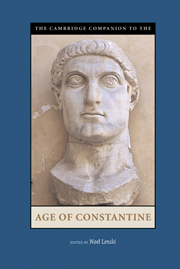Book contents
- Frontmatter
- Introduction
- 1 Sources for the History of Constantine
- Section 1 Politics and Personalities
- Section II Religion and Spiritual Life
- Section III Law and Society
- Section IV Art and Culture
- Section V Empire and Beyond
- Appendix 1: Stemmata
- Appendix 2: Timeline
- Maps
- Primary Sources and Translations
- Secondary Bibliography
- Index
Introduction
Published online by Cambridge University Press: 28 September 2007
- Frontmatter
- Introduction
- 1 Sources for the History of Constantine
- Section 1 Politics and Personalities
- Section II Religion and Spiritual Life
- Section III Law and Society
- Section IV Art and Culture
- Section V Empire and Beyond
- Appendix 1: Stemmata
- Appendix 2: Timeline
- Maps
- Primary Sources and Translations
- Secondary Bibliography
- Index
Summary
The age of Constantine is one of the most fertile periods of historical change in all of antiquity. By itself, his elevation of the Christian faith from the depths of the persecution it suffered in his youth to the religion of his imperial household testifies to the growth of a new genus of government and a new sort of emperor. Cast by Constantine into the open light of toleration and imperial support, Christianity blossomed into a thriving offshoot of Mediterranean religious life. By the mid-fourth century, it had grown broad enough to cast its shadow over not just religious matters but art and architecture, philosophy and thought, literature and learning, politics and foreign relations, law and social practice. To be sure, Constantine was never so revolutionary that he turned up the roots of what had gone before and planted the field of history afresh. Rather, much of what he accomplished was to bring to fruition trends and tendencies that had sprung up long before his reign. Yet it was Constantine’s genius to have distinguished between productive cultural strains and the infertile tares that were doomed by the climate of history to die out. The age of Constantine thus witnessed not so much a re-creation of the historical landscape as a new emphasis on the cultivation of those features that had previously been pruned back. The result was the growth of the period now referred to as late antiquity - roughly the fourth through sixth centuries ad - a period that has aroused tremendous interest among the present generation.
- Type
- Chapter
- Information
- The Cambridge Companion to the Age of Constantine , pp. 1 - 13Publisher: Cambridge University PressPrint publication year: 2005
- 2
- Cited by

